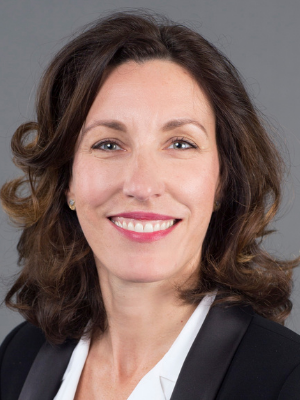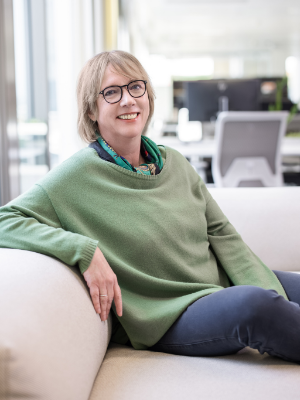 “You are stronger than you think,” reflects Bessie Kokalis Pescio on the best piece of advice someone gave her as she embarked upon a new hobby of cold-water swimming last fall. “What a true statement. Perseverance and resilience apply to swimming as well as work.”
“You are stronger than you think,” reflects Bessie Kokalis Pescio on the best piece of advice someone gave her as she embarked upon a new hobby of cold-water swimming last fall. “What a true statement. Perseverance and resilience apply to swimming as well as work.”
The pandemic she believes has evoked progress in the workplace as it pertains to creating more access and interaction between senior leaders and employees, creating opportunity for careers to flourish. She comments on how interesting it is that employee habits changed so quickly and how things shifted when the traditional working environment went remote.
“The pandemic created a democratization of communications. How much easier is it to get in touch, to send a message to a senior executive now than before? Even the CEO is accessible in a way that wasn’t possible until recently. Throughout his inaugural listening tour we had 15,000 people interacting with him, asking questions and sharing their perspective.”
She is passionate about connecting people and letting them tell their stories. She is excited to see the electronic PMI platform, called One PMI, let people connect in a way that wasn’t used as optimally pre-pandemic. She cites that when you combine the right types of tools, it helps connect people to others and to their communities with pride and dignity as something that is energizing her at work right now.
“We have a unique opportunity to facilitate a dialogue between senior leaders and employees. A two-way conversation to learn what people want to talk about is now possible with technology and intent.”
In fact, this idea of a two-way conversation between managers and employees is at the heart of the PMI’s internal communications strategy and exploring what success, growth, and belonging looks like for each person is the central tenet for this year. She adds that the three main questions that occur are around how to be successful, how to grow and what can people contribute to be part of a community. This came through time and time again, and giving people a range of ways to connect and relate to each other, from podcasts to panels, is at the heart of the progress plan.
“People are tired of slogans and campaigns and want to see how the workplace is experienced. Who doesn’t? You have got to be straight with people and transparent. You have to do what you say you are doing to make work ‘work’ for people today.”
The Path to PMI
Kokalis Pescio grew up in a bilingual home and originally planned to follow an academic career as a French language professor. It was in an entrepreneurial environment while working as a linguist that she realized she loved learning about business, the customer, work habits and continuous learning itself. Flash forward to an MBA and DC-based consulting work in healthcare later, she joined PMI (Phillip Morris International) and now is the Vice President, Global Internal Communications, based in Switzerland. She recalls entering the firm sixteen years ago completely compelled by the mission and continues to be fascinated by the operational and culture change that is happening at PMI, noting that the best part is that the company has really put its money where its mouth is for the change work involved in creating a smoke-free future.
“People at PMI feel aligned to the same incredible mission. Change isn’t easy, but we have had such a clear idea of where we are going and watching the company be successful in taking a legacy product to fund a new and innovative product, upskilling people, and operationally transforming at the same time has been a great journey to be part of.”
Career strategies
Kokalis Pescio believes the most important thing to do is to know yourself. Her advice to her younger self would be to try to self-aware, to have the sensibility to ask yourself where you are truly with relationships, and to know the parts of your personality and traits that show up.
“Knowing where you are and who you are can enable self-correction where appropriate and also allow you to be authentic.” She believes that knowing this information about yourself can help you to take advantage of opportunities in your career and help you capitalize on your strengths and partner with others who can either teach you or be partner experts in doing the work that they are good at also.
“Figure out who can help. You cannot be a master of everything, nor should you be. Get a distributed style of management to get further, faster. Ask yourself who do I know and what do I need to learn?”
Kokalis Pescio is passionate about mentoring women and is doing so as part of PMI’s gender-focused employee resource group, Women’s Inspiration Network (WIN), and externally as part of her alma mater, Babson College’s F.W. School of Management. She admits that she didn’t have a formal mentor as she was coming up the ranks and reiterates that with or without a mentor everyone, not just women, should stand up for themselves.
“Have the courage, dignity, and self-respect to understand your boundaries, this will make you confident and comfortable. People make tradeoffs, those compromises, if you go too far, can make you lose a little part of your soul. It is important to stay within your boundaries.”
When asked what has surprised her most on the journey? She replied that she was surprised by how much she can learn constantly from the people around her.
“I have learned to not be afraid to do something new, no matter how large or small the task. While I have worked at a large corporation for 16 years, my career path is far from traditional. This aspect of my career, working not only across many different divisions, but also with employees from and located in numerous countries, has taught me to continuously be open to trying different things. Some are harder than others, and some efforts are more successful than others, but I am always ready to try something different.”
By Nicki Gilmour

